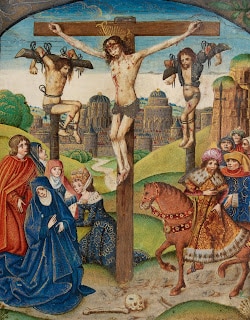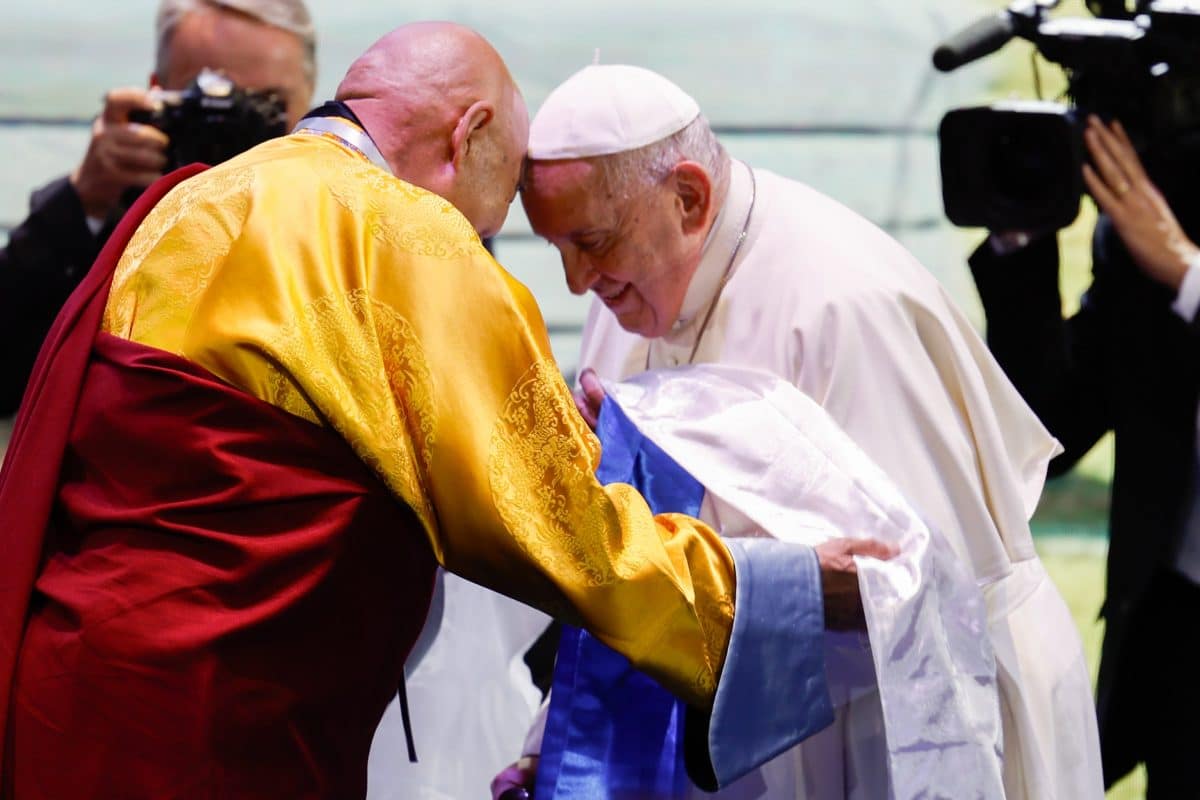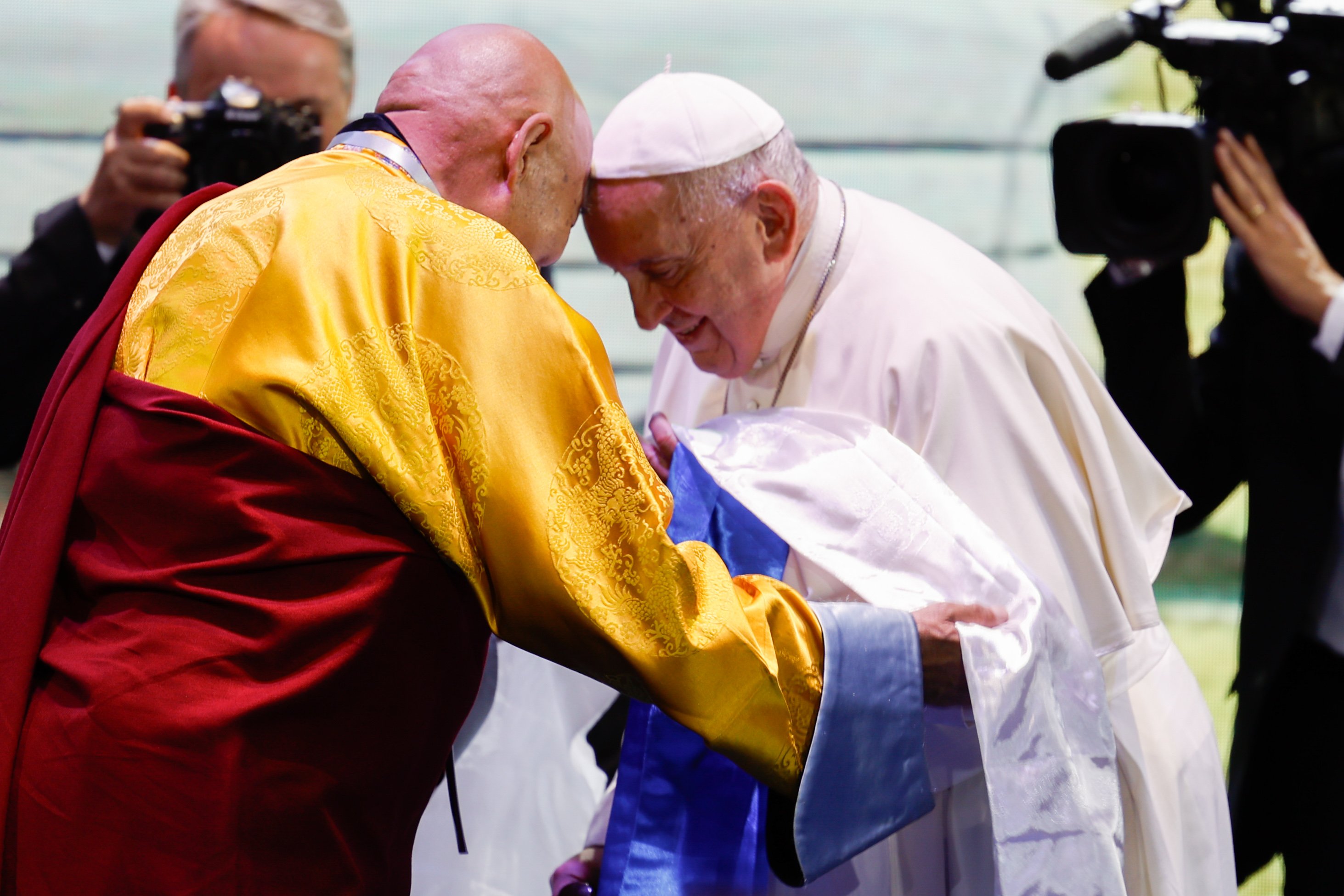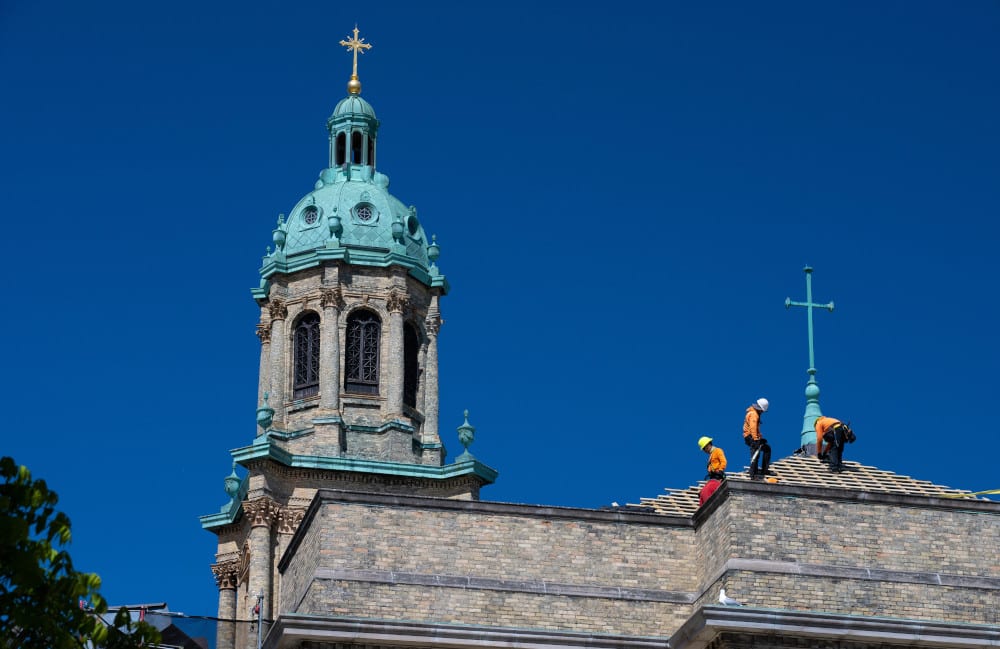(Twenty-Second Sunday in Ordinary Time-Year A; This homily was given on September 2 & 3, 2023 at Saint Augustine Church in Providence, Rhode Island; See Romans 12:1-2 and Matthew 16:21-27)
Paschal Mystery


(Twenty-Second Sunday in Ordinary Time-Year A; This homily was given on September 2 & 3, 2023 at Saint Augustine Church in Providence, Rhode Island; See Romans 12:1-2 and Matthew 16:21-27)


Less than a month ago, Pope Francis made global headlines for a Mass in Portugal that attracted a crowd of over 1.5 million attendees. Here in Mongolia, on Sept. 3, the pontiff turned his attention to a local church that boasts fewer than 1,500 Catholics in the entire country.
« I thank God for you, since, through you, he loves to use what is little to achieve great things, » Pope Francis told one of the world’s smallest and newest Catholic communities at the conclusion of Mongolia’s first ever papal Mass.
« Go forward, gently and without fear, conscious of the closeness and the encouragement of the entire church, and above all the tender gaze of the Lord, who forgets no one and looks with love upon each of his children, » the pope heeded.
« Mongolia is a nomadic country, full of farmland, and Pope Francis is like a shepherd pastoring his sheep, » said Shirin Pang before the Mass began. « He’s looking after each one of them, even if there are so few Catholics. »
Pang had traveled from her homeland of Singapore to help volunteer for the papal events here in Mongolia after first visiting the country earlier this summer.
« I heard the pope was coming, and I just wanted to help out, » she told NCR, noting that she was struck by how unique the Catholic Church is here.
« At home, if you don’t arrive at Mass early, you won’t get a seat, » she said. « Here, the church is just beginning to grow. »
And for that reason, the 86-year-old Francis — who over five decades ago hoped to be a Jesuit missionary in Japan — has undertaken his 12th visit to Asia of his decade-long papacy in an effort to bolster a church still in its infancy.
« Our church is in that phase typical of children who constantly ask their parents questions, » Mongolian pastoral worker Rufina Chamingerel told the pope on Sept. 2 during a meeting with the country’s priests and missionaries.
When the first Catholic missionaries arrived here in 1992, the country was just emerging from nearly a century of Soviet rule, where religious practice was prohibited. Just over 30 years later, the faith is slowly being reborn in Mongolia, which now boasts two native-born priests and even the world’s youngest Catholic cardinal, 49-year-old Giorgio Marengo.
« Catholicism has basically totally moved from the West to the East, » Pang observed. « The people in Asia really have a heart for God. »
Advertisement
That reality was on display in the Steppe Arena, an ice hockey rink where amid the smell of both popcorn and incense, some 2,000 Catholics from South Korea, Vietnam, Hong Kong and even neighboring China — defying efforts by authorities to forbid Chinese faithful from participating in the pope’s visit — joined the local Mongolian faithful for the Mass.
« We wouldn’t be this close, even if we were to go to the Vatican, » said 35-year-old Gazelle Hernandez, who moved to Mongolia from the Philippines three years ago.
Reflecting on what it’s like going from one of the world’s most populous Catholic countries to one of its smallest, Hernandez told NCR that it makes the faith feel more personal.
« I get to be closer to people, because I know them all, » she said.
Her Mongolian parish member concurred.
« I can’t believe the pope is here, and I get to see the pope in my own eyes, in my own country, » said 22-year-old Ouyummaa Enkhtuvshin, who attended the Mass with her parents and three siblings.
Enkhtuvshin said that unlike many Mongolian Catholics, she was born into a Catholic family, which she said made it « easier to pick up the ideas and values » of the faith than it is for many Mongolians.
Another Mass goer, Henri de Solages, who moved here from France two decades ago and now has two children with his Mongolian wife, acknowledged that Catholicism remains foreign for many Mongolians, noting that many Catholics did not know what the pope even looked like until the papal visit was announced.
« But we are all still happy to be here, » he said.
Yet despite the somewhat unconventional circumstances of both the visit and the faith in the country, Francis used his homily to link the Mongolian church with the universal church.
« All of us are ‘God’s nomads,’ pilgrims in search of happiness, wayfarers thirsting for love,' » the pope told them.
At the conclusion of the Mass, the pope went on to offer a special, unscripted acknowledgment of the Chinese Catholics in attendance, thanking them for their attendance and asking them to be both « good Christians and good citizens » — an apparent reference to the government’s ongoing crackdown against religious believers in the country.
Earlier in the day, Francis began his morning with what was described by local leaders as a « historical » encounter with the country’s interreligious leaders, where the pope shared the stage with representatives from a dozen other traditions.
Francis — who has consistently prioritized interfaith dialogue in his papacy, and especially during his travels — told those gathered that it was incumbent upon religious leaders to choose fraternity over fundamentalism.
« We are called to testify to the teachings we profess by the way we act; we must not contradict them and thus become a cause of scandal, » said the pope, in a speech that included quotes from Buddha, Mahatma Gandhi and Jesus Christ.
« There can be no mixing, then, of religious beliefs and violence, of holiness and oppression, of religious traditions and sectarianism, » the pope said.
Among those joining Francis on stage were representatives from the Russian Orthodox Church, Judaism, Buddhism, Hinduism, Islam, Shintoism, the Church of Jesus Christ of Latter-Day Saints and an evangelical pastor.
While over 40% of the Mongolia population identifies as non-believers, the country has a long tradition of religious tolerance, dating back to its 13th century founder Genghis Khan.
Ahead of the pope’s arrival here, Mahinda Deegalle, a professor at Bath Spa University in the United Kingdom and an expert in Buddhism, told NCR that many Buddhists — which make up 53% of the population of Mongolia — consider Francis to be « a living saint. »
In particular, said Deegalle, Francis had prioritized dialogue with Buddhists more than any other pope since the Second Vatican Council, adding that he believes this visit to Mongolia will be remembered for opening up a « new phase of interfaith dialogue. »
« Dialogue, the pope told the diverse leaders, is not antithetical to proclamation. It does not gloss over differences, but helps us to understand them, to preserve them in their distinctiveness and to discuss them openly. »
On Sept. 4, prior to departing Mongolia, Francis will visit a shelter that provides healthcare and social services for homeless individuals and victims of violence. The center, known as « The House of Mercy, » is operated by the Catholic Church here and is open to people of all faiths and none.
Afterwards, the pope will board an 11.5 hour flight back to Rome, where an in flight press conference is expected.


When was the last time you let God have it in anger? I suspect lots of Christians balk at the idea of telling God off. It sounds irreverent, perhaps even blasphemous. Unlike us, our Hebrew ancestors knew that along with love, praise and petition, a deep relationship with God can withstand angry outbursts and even some whining.
Jeremiah is the champion lamenter of the Hebrew Scriptures — and that’s saying something. (For another prize-winning complaint check out Psalm 22:7, 13-19 — and that’s just one among a multitude of examples!) The Hebrew tradition of « fear of God » (utter awe at God’s greatness and compassion) allowed for the expression of deep passion.
Remember Abraham? Questioning God took him to the threshold where God could make a promise greater than Abraham would have imagined (Genesis 15:1-6). Then we have Moses, who tried to avoid confronting the Egyptians by claiming a speech impediment; God reminded him of who gave humans the power of speech and then promised the human help he needed to do what he was called to do (Exodus 4:10-17).
When we hear Jeremiah cry, « You duped me, » our translation has made his complaint polite, washing out its passion. A translation truer to what Jeremiah said is: « You seduced me, Lord, and I let myself be seduced. » Once again, we seem to be treading toward blasphemy, right? But listen as Jeremiah continues to pray: « I want to quit this ministry, but your word is like a fire in my heart. When I try to hold it in, it explodes inside me. I can’t withstand it! It’s about to break my bones! » Now that’s a lesson in praying with passion!
When we hear Jeremiah cry, « You duped me, » our translation has made his complaint polite, washing out its passion. A translation truer to what Jeremiah said is: « You seduced me, Lord, and I let myself be seduced. » Once again, we seem to be treading toward blasphemy, right? But listen as Jeremiah continues to pray: « I want to quit this ministry, but your word is like a fire in my heart. When I try to hold it in, it explodes inside me. I can’t withstand it! It’s about to break my bones! » Now that’s a lesson in praying with passion!
What had happened to Jeremiah was that he received a new perspective. God enticed him into a mindset and course of action that he didn’t want but couldn’t refuse. This is what Paul tries to encourage in the Romans as he says, « Don’t conform to this age. Let yourself be transformed to learn what is really good and pleasing and perfect. » Now, if you think we’ve drifted out of passion and into pious platitudes, you’re missing the point.
Today’s Gospel invites us to enter into the Christian adventure with countercultural passion. After last week’s rendition of Peter’s proclamation of faith, Jesus tells the disciples that being the Messiah is not what they would like to imagine. In response, moments after proclaiming unconditional faith, Peter became Jesus’ tempter. Echoing the devil who urged Jesus to use his power for himself and make God his security blanket (Matthew 4:1-10), Peter reproached Jesus for talking about suffering.
Echoing his words to the devil himself, Jesus told Peter to get behind him. Yet, Jesus’ approach to Peter was not really a dismissal. Using the same vocabulary he had used when he first invited Peter to discipleship, Jesus told Peter, « You are to follow me, not vice versa. »
With that, Jesus offered Peter the divine seduction. « Those who wish to save their lives … » In other words, « Focusing on your own safety is a vicious circle — you’ll never have enough of it. If you are free enough to give yourself, nobody can threaten you ever again. »
Jesus was inviting Peter to remember why he had followed him in the first place. Jesus didn’t call his friends to ascetic sacrifice, but to a life full of the unique joy that comes from the freedom to be for others. This was not a call to a discipleship of cheering a prophet or studying under a rabbi. Jesus was inviting Peter and company to share his very purpose in life.
Matthew, Mark and Luke recount this story as we hear it today. John communicates the same idea by quoting Jesus as saying, « I am the vine and you are the branches » (John 15). In both instances, Jesus was inviting them to an all-or-nothing choice: Become a part of me, or make your own path to wherever it will lead.
Might we take these readings as teachings about prayer and discipleship? Both Jeremiah and Peter had a bone to pick with God. And for both of them it had to do with going where they had never intended to go. But, as we saw above, Jeremiah received a new perspective. Nothing was forced on him. Nor on Peter and friends. They had their own ideas and God enticed them beyond their safe havens.
Today we’re reminded that, whether we like it or not, the God of Jesus is the great seducer. God simply can’t let us settle for puny expectations and sheltered sanctuaries. This God who risked creation and incarnation wants us to share the divine passion — to provoke us into finding our life by letting go.


The chairman of the U.S. bishops’ domestic policy committee said the nation has « urgent work » to do to really show a « radical solidarity with working families » and provide ongoing support for the well-being of all families.
« There are signs of improvement and concern regarding the economy, » Archbishop Borys Gudziak of the Ukrainian Archeparchy of Philadelphia said in an Aug. 30 statement the U.S. Conference of Catholic Bishops issued in advance of Labor Day on Sept. 4.
Despite positive economic indicators of low unemployment, slowing inflation and new jobs being added, « more families feel like they are worse off today than the year before, » he said, citing a Federal Reserve report.
« There is still urgent work needed to exercise radical solidarity with mothers, children, and families, » said the archbishop, who is the chairman of the USCCB’s Committee on Domestic Justice and Human Development. « Let us pray and act towards this end, always listening to the Lord who fulfills glad tidings in our hearing his word each day. »
Gudziak also said « the essential role labor unions can and often do play in society must be acknowledged and affirmed, » and added that unions should « continue to be supported in their work that supports healthy, thriving families, especially those who are most in need. »
The archbishop highlighted the needs American families were facing in today’s economy.
« The percentage of Americans who cannot afford an unexpected $400 expense has increased to 37%. While price increases are not as steep as they once were, grocery prices have still risen nearly 5% over the last year, » he said, pointing to other statistics, including that three out of 10 mothers report « there have been times in the past year when they could not buy food. »
« Millions have been priced out of homeownership while rental housing becomes even less affordable, » he continued, and the cost of health care « is becoming out of reach for too many. »
« We are called to join Jesus in his ministry to bring glad tidings to the poor. We must do more to support families, » he said, noting that last October, the chairmen of several U.S. bishops’ committees called on Congress to show a « radical solidarity » with mothers, children and families in a post-Roe world. In June 2022, the U.S. Supreme Court’s Dobbs v. Jackson Women’s Health Organization ruling overturned its 1973 Roe v. Wade precedent that legalized abortion nationwide, sending the issue back to the states.
In an Oct. 26, 2022, letter to Congress, the bishops’ chairmen for their pro-life activities, family life, domestic policy and migration committees shared « their vision for an authentically life-affirming society that truly prioritizes the well-being of families and generously welcomes new life. »
« They highlighted the USCCB’s long history of support for nutrition programs, affordable housing, access to healthcare, safety net programs, and justice for workers — including things like just wages, support for organized labor, and safe working conditions regardless of immigration status — and called for policy solutions to support all children and families, » Gudziak recalled. Those priorities remain the same for the U.S. church, he said.
He pointed to laws Congress did enact at the end of last year that support families, measures the U.S. bishops backed, such as the Providing Urgent Maternal Protections (PUMP) for Nursing Mothers Act and a permanent option for states to extend postpartum Medicaid coverage for one year after birth.
But Congress should strengthen the Child Tax Credit, Gudziak said. Congress allowed the measure to expire at the end of 2021, with the consequence that 3.7 million children slipped back into poverty, with Black and Latino families experiencing the biggest impact, according to Columbia University’s Center on Poverty and Social Policy.
Gudziak also called for « national support for paid family leave, » emphasizing it is « pro-life to support families », and he said there needed to be « better access to affordable, quality child care and pre-kindergarten, which also ensures just wages for child care workers and teachers. »
Additionally, he said « families that choose to care for children at home should be supported. »
« Faith-based child care and early education programs have served families for decades and should be included as part of the solution, in a manner consistent with their freedom to retain their religious character, » he said.
« It is good that bipartisan discussions are happening right now around all of these issues, » Gudziak said. « Congress should take prompt action in all of these areas to protect the well-being of mothers, children, and their families. »
But he added, « Public policy changes are not the only way we can help families thrive. »
He said, « Communities can organize to call attention to the problems facing families and to bring about solutions, » adding that the Catholic Campaign for Human Development, the bishops’ domestic anti-poverty program, « supports this work and is a great help to families that are struggling. »
One example he pointed to is Washington Home Care Cooperatives in western Washington state, which receives CCHD support to provide « good-paying jobs through worker-owned businesses to those who deliver in-home care to elders and people with disabilities. »
The bishops started CCHD 50 years ago to « empower people experiencing poverty to take action to help themselves, » Gudziak said.
He stressed labor unions are key to working families’ thriving and should be « encouraged in maintaining and increasing their focus on performing that critical role. »
« Indeed, as Pope Francis has suggested, ‘there are no free workers without trade unions,' »
he said, underscoring the pope’s statement that they must also « be a voice for the voiceless. »
« The purpose of the economy is to enable families to thrive. This notion is deeply rooted in Catholic social teaching, » he said, adding that the church officially teaches that businesses, professional organizations, labor unions and the state must « promote policies that, from an employment point of view, do not penalize but rather support the family nucleus. »
The Second Vatican Council said the « ‘entire process of productive work … must be adapted to the needs of the person and to his way of life, above all to his domestic life, especially in respect to mothers of families,' » Gudziak said. « Are we meeting these standards? There is much more we can do. »